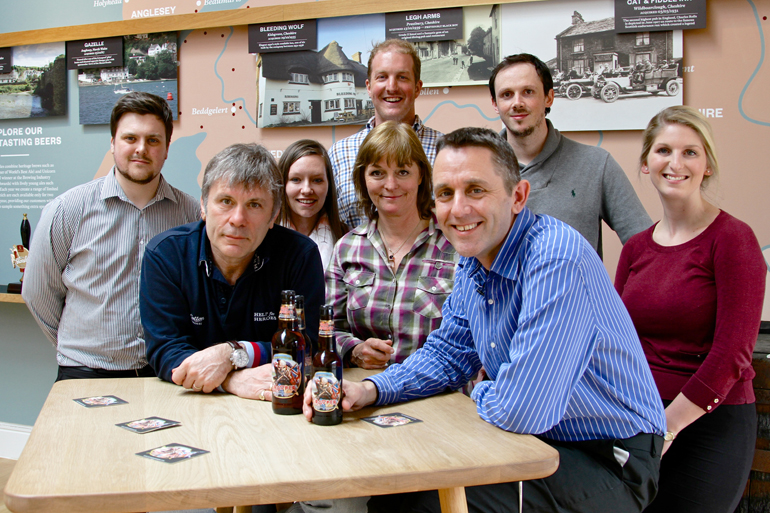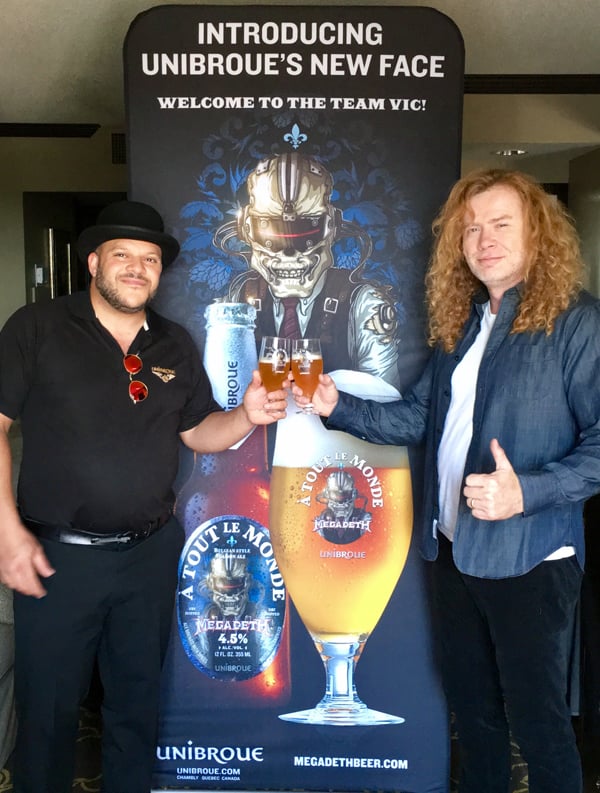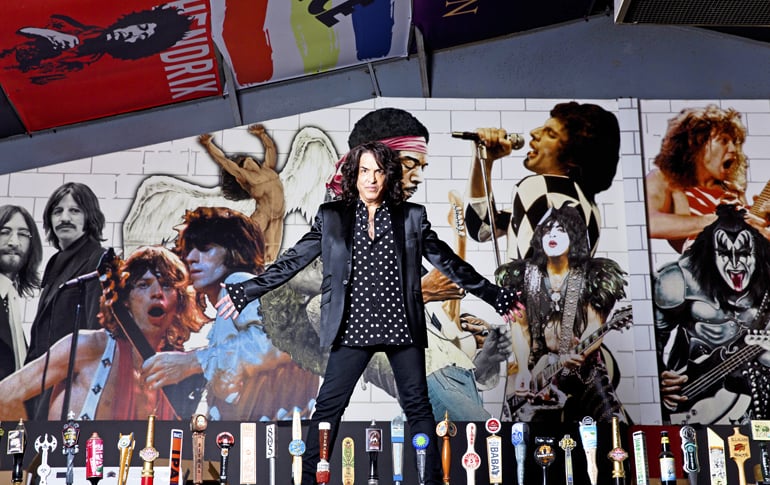Start 14-Day Trial Subscription
*No credit card required

Real Ale In Rock & Metal
Rock music has been associated with excess since its inception. Along with its companion activities, sex and drugs, the genre’s hallmark characteristics have been about going big, bold, and beyond societal expectations. But it’s made to be enjoyed by all, and much of it takes considerable technical ability, often discernable only to the trained ear.
In many ways, American craft beer has followed a similar trajectory. Bucking the trend of the mass-produced lager, brewers began to question what they valued in a beer, and what it means to drink one. The result has been a revolution of significant cultural impact that is still unfolding, both an expansion and liberation of tastes.
No one wants a soulless product shoved down their throats. People crave authenticity, and they thirst for what truly speaks to them. Enter the artists to give voice to those who have not been heard, and to reanimate an integral part of life that has been bastardized and commoditized by those who value the dollar above all. Are we talking about brewers or musicians now? Are they really any different?
Music and beer come from living organisms, then take on a life of their own as vehicles of expression. Join us as we explore the symbiotic relationship between the two artforms with help from some of rock and metal’s “O.G.’s”.
The Number of the Yeast
Iron Maiden is to the metal genre what Sierra Nevada is to craft beer – others came before, but few have done more to define their respective areas of expertise, and both have done so on their terms, without alienating those who helped them etch their names in history.
This is a rare feat, given that both metal and craft beer fans can sniff out inauthenticity in the single-digit parts per million. The slightest hint of ‘selling out’ snuffs out loyalty that may have taken years to earn.
How do these megaliths still command respect from hardcore fans decades later? They make decisions that align with their values on both a personal and business level, and they retain full creative control over what they produce.
If you’re not familiar with Iron Maiden frontman Bruce Dickinson and his band’s collaborative effort with Robinsons Brewery, TROOPER, then you might assume it’s just a name slapped on a label. However, the collaboration was born from Dickinson’s passion for beer, specifically English cask ale.
“I went to school in the countryside,” Dickinson said, “and we had loads of great beers in Northhamptonshire. I was brought up on beer when it was still made in wooden casks and gravity fed – low carbonation, but it was a subtle mix of flavors – flowers or nuts. Brewing is a gentle, organic process, and the flavors don’t need to be overamped.”
When asked what he would tell the aspiring drinker and brewer, Dickinson emphasized the importance of seeking to drink and brew beers with subtlety, a philosophy honed in his youth and applied to his collaboration brews. "Let's make interesting beer, which as a by-product may make you cheerful and happy, but the initial rush is one of 'Wow, what a great taste. What a great flavor.' To me that's what's most important."
After turning down offers to associate with wine brands, Dickinson, who grew up sought out a brewery which would allow him to take part in the creative process.
“I had to audition for them,” said Dickinson of Robinsons Brewery, “which I thought was excellent, because they were as passionate about the quality of their beer as I would be if I were going to play with a new musician. You want to make sure that he or she can really cut the mustard.”
After successfully “auditioning” for Robinsons by identifying beers by brand and style in a blind taste test, Dickinson chose the hops and malts he wanted to use with Robinsons’ head brewer Martyn Weeks, who came back with two test brews. To Dickinson, the choice was clear – a subtle, sessionable beer that works in cask and keg and can.

After successfully “auditioning” for Robinsons by identifying beers by brand and style in a blind taste test, Dickinson chose the hops and malts he wanted to use with Robinsons’ head brewer Martyn Weeks (pictured front right), who went to work on what would become TROOPER.
“I don't drink to get drunk,” Dickinson says. “It might be a nice after-effect, but I drink because I love beer. So we tried to come up with an ‘everyman's beer’ that’s not bland – one that you could drink and say 'Hey, that's gonna be my beer. I'll take it any day, because it's like an old friend.’ You may wander, but you'll always come back to it. And that's actually a really difficult thing to do."
There’s a reason certain artists can maintain decades-long careers while others burn fast and bright. Those who live to express themselves value their creative journey above all else. For Dickinson, crafting beer is another creative pathway to explore, and a gateway to a yet-unconquered arena. With over 15 million pints sold, Trooper may yet give Iron Maiden’s album sales a run for its money, but the real pride comes from building something from the ground up.
The Trooper journey continues with the latest entry in the series, the just-announced “Hallowed”, a Belgian-inspired ale with a British twist due in October.
Breweries Sell… But Who’s Buying?
Megadeth and its outspoken frontman Dave Mustaine built an empire atop complicated, touchy subject matter like politics and religion, presenting it in an uncompromising fashion. By not backing down and caving in to the paradigms and powers that dictate the masses, the band amassed a dedicated following.
Handing over the reins to a third party for a big payout would spell imminent destruction. This is a huge, valuable lesson for craft brewers.
Mustaine and Unibroue Brewmaster Jerry Vietz share a pint of À Tout Le Monde.
As a brewer, what is your ethos? Are you brewing to make it big, or are you brewing because you love making beer and the people around it? If you know from the start, you will never run the risk of leaving those who helped you succeed feeling betrayed.
In his own words, Mustaine is “just out of the gate” in the craft beer world. So you may be surprised to learn that his and Megadeth’s entrance into the beer market is a 4.5% ABV dry-hopped saison produced by Unibroue. À Tout Le Monde is a “Belgian style dry hopped golden saison with hoppy and spicy notes, topped with an unctuous head and a crisp, dry finish,” crafted according to Mustaine’s tastes by close friend and Unibroue Brewmaster Jerry Vietz.
The beer draws its title from the eponymous Megadeth song released in 1995, regarded as one of the band’s most personal, and translating to “to all the world” or “to everyone.”
Coupled together, the song and beer are a study in defying expectation. Both are structured surprisingly, and can be thought of as “power ballads,” – something crafted with a softer hand than previous experience would lead you to believe. Less can be more. Again, in music and beer, sometimes the sessionable ale says more than the syrupy stout with the ‘gain’ cranked to eleven.
For Mustaine, who also owns a vineyard, the journey into the beer and wine industry is one of personal significance, and the chance to pass on a lasting legacy for his family.
“When I was a teenager, my mom and I were very poor. We lived in an apartment and had food stamps, state assistance and so on. I’d come home from school, open the fridge and there was a six-pack of white cans with blue letters on them that said ‘Beer,’ and I would drink them. I didn’t realize as a kid how much you want that beer after work, how important it is after a long day.”
In À Tout Le Monde, Mustaine recognizes the sacrifices his family made to help him, and aims to pass them on to future generations.
“I love this business. I want to do it until I can hand it off to my grandkids, and they can hand it off to theirs.”
No matter what you think of Megadeth and Mustaine, keeping business independently owned is a hallmark of true craft beer, and a way to guarantee more jobs for more people, and more soul in your work.

Bands as Brands
Say what you want about KISS, but when it comes to marketing, they are an undeniable force. It may come as no surprise then, that since 2010 they have been operating Rock & Brews, a chain of rock themed brewpubs which has since grown to 20 locations nationwide.
You may scoff, but there are many direct parallels between KISS’s success and a brewer’s path to growth in the beer business.
For one, KISS married their art with their business, and dedicated themselves wholly to both. They associated their brand with a specific look (which they applied themselves, night after night), and associated their sound with a specific vibe.
Consistent art direction in beer packaging can be a huge selling point, as can the ‘feel’ of the brewery. Look at TRVE Brewing and Three Floyds, whose Dark Lord’s Day is as much about music as it is about beer. They are known as metal breweries, and by committing to that vibe have tapped into a subculture within a subculture.
Breweries which pick a path and feel, give themselves and their fans direction, and a common cause. You might identify with a “working man’s brewery” or a “punk” or “golden oldies” brewery… The brewery which can embody the ethos of its look and feel will resonate on a deeper level with the consumer.
That goes for musicians too. Take it from Paul Stanley: “I only wish that some rock bands put as much care and quality into their music as countless craft and microbreweries do.”
Stanley's philosophy for Rock & Brews is informed by his early days as a musician – he remembers what it's like to be just starting out.
"We try to make sure that we have a broad enough variety that everyone’s tastes can be satisfied and the adventurers can find something new to excite them beyond all of the national brews that we carry. We also try to make sure we champion local breweries and small producers. In that way, we help the small, and dedicated brewers compete on some level with the more established."
Both breweries and bands start small, and DIY, leaving their careers to build a grassroots following, one beer or music festival at a time. Overextending production and distribution is a classic pitfall. Only after the bootstrapped early days will success come, and when it does, you’ll be there like KISS to “Lick It Up.”

KISS married their art with their business, and dedicated themselves wholly to both.
I Wanna Bock! (Becoming a Rockstar Brewer)
There’s a fascinating element of escapism in the craft beer universe. The act of drinking is itself an escape from “the daily grind”, as is the enjoyment of music, but it extends further.
For those who enjoy beer, the brewer takes on somewhat of a mystical role, unbound by the plight of the common man. Who hasn’t dreamed of shucking the shackles of the 9 to 5 in exchange for a life on one’s own terms?
For most, it’s just risky and impractical, if not impossible. Many have tried and most have failed, but for the few who make it, glory awaits. Thus, we gaze with admiration, and sometimes jealousy upon those who have chosen to leap into the void and lived to tell the tale. And then we ask for their autograph.
Beer is the everyman’s drink, but it’s made by a select few, and in the world of craft, the beer has personality. It’s a reflection of its creator, and if we dig the reflection, we want a piece of the real thing.
We become curious about the creators of the things we love, and we delve deeper into their lives – reading interviews, following them on social media, and hopefully getting the chance to know them.
Chances are, if they’re fearless enough to become a career brewer and talented enough to make great beer, they’re natural leaders with strong personalities and opinions, and a wealth of experience to share. They’re out of the garage and in the public eye. As their creations become more widely produced, the lives they touch increase exponentially. Through their beer, they have spoken, and we’re listening.
Craft beer is a state of mind, and a lifestyle. You choose to seek it out, and to seek out others who like it. And there was a single beer which set you on that path, with a brewer behind it. While they may be an overweight baby-boomer with a mound of Nordic face-fuzz, they also changed your life.
Just as Bruce Dickinson doesn’t drink to get drunk, those who pursue their passions do so regardless of whether money awaits. Their willingness to do so is what attracts the fame and fortune, and allows them to attach their name to a beer without completely abandoning their values.
What passion is brewing within you?

Photos courtesy Robinsons Brewery/Iron Maiden, Unibroue/Megadeth, and Rock & Brews/KISS)



